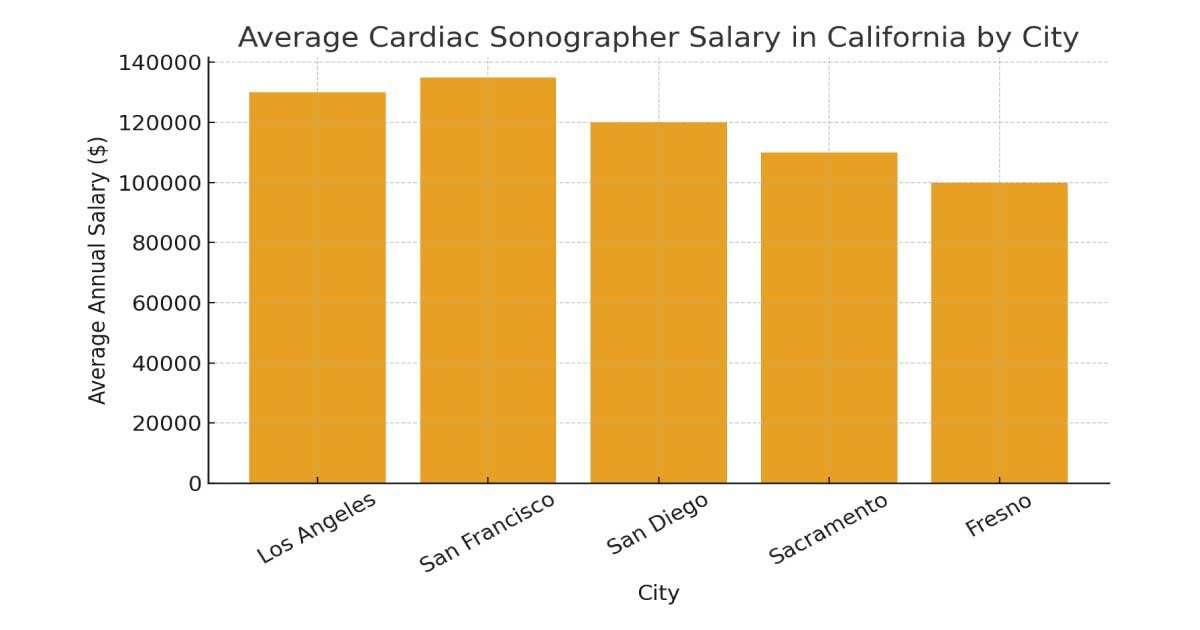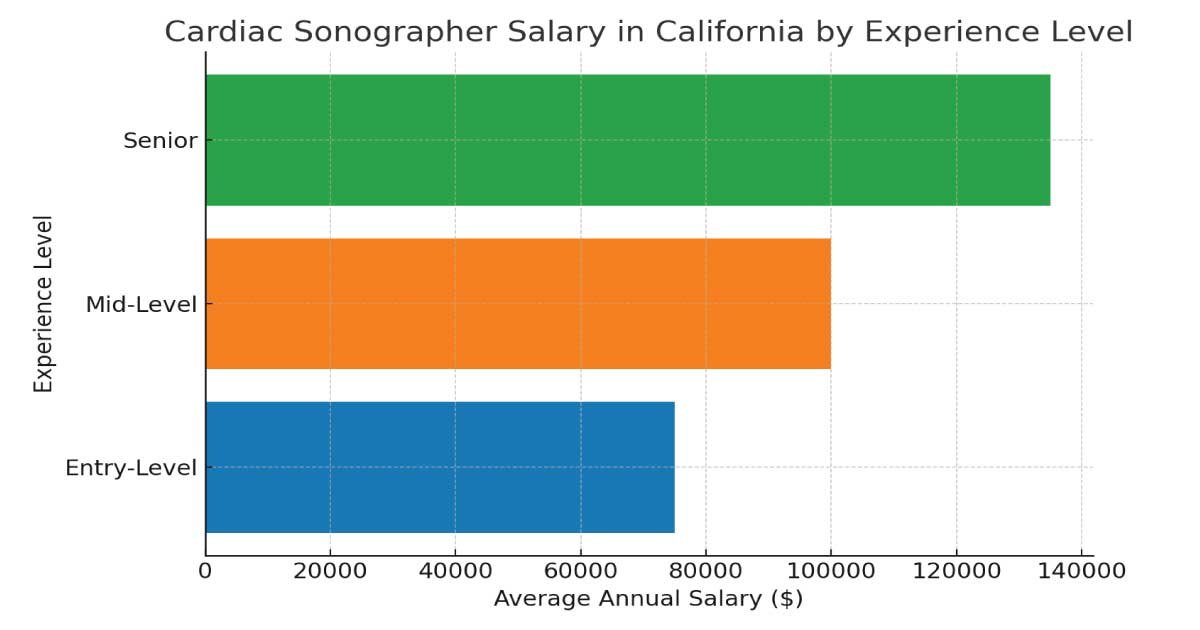When people picture careers in healthcare, they usually think of doctors, nurses, or surgeons. But there are many specialized roles behind the scenes that make modern medicine possible. One of those is the cardiac sonographer, a professional trained to use ultrasound to look at the heart, its chambers, valves, and blood flow.
In a state like California, where healthcare is both advanced and in high demand, this career not only provides meaningful patient care but also offers a strong salary. If you’re curious about how much cardiac sonographers make in California, what factors influence pay, and what the career outlook looks like, this post breaks it all down in detail.
What Does a Cardiac Sonographer Do?
A cardiac sonographer, often called an echocardiographer, operates ultrasound machines that produce real-time images of the heart. These images help doctors diagnose heart disease, monitor blood flow and evaluate heart performance.
Their daily responsibilities include:
-
Performing echocardiograms on patients of all ages
-
Working closely with cardiologists to interpret results
-
Ensuring patients are comfortable during the procedure
-
Preparing reports and maintaining imaging equipment
This role requires not only technical skill but also compassion and patience, since many patients undergoing heart imaging are anxious or unwell.
Why California Is a Top State for Cardiac Sonographers
California stands out as one of the best states for healthcare careers. Several reasons make it a particularly strong location for cardiac sonographers:
Large population – Millions of residents require cardiac care, creating constant demand.
World-class hospitals – From Los Angeles to San Francisco, California hosts some of the most advanced medical centers in the country.
High cost of living – Salaries are naturally higher to help offset housing and living expenses.
Career growth opportunities – Specialized departments and research institutions mean more chances for advancement.
Because of these factors, cardiac sonographers in California tend to earn more than the national average.
Average Cardiac Sonographer Salary in California
The pay scale for cardiac sonographers varies depending on experience, city, and workplace setting. However, California salaries consistently rank among the highest in the nation.
Here’s a simple breakdown:
| Level of Experience | Hourly Wage | Monthly Salary | Yearly Salary |
|---|---|---|---|
| Entry Level (0–2 years) | $32 – $40 | $5,500 – $7,000 | $66,000 – $84,000 |
| Mid Level (3–7 years) | $41 – $55 | $7,100 – $9,500 | $85,000 – $115,000 |
| Senior Level (8+ years) | $56 – $75+ | $9,600 – $13,000+ | $116,000 – $155,000+ |
This table shows why many professionals choose California, it offers both competitive starting wages and room for growth.
Salary by Region in California
Not all parts of California pay the same. Salaries often rise in big cities due to demand and living costs.
Los Angeles & Orange County – Cardiac sonographers here earn some of the highest wages, often exceeding $120,000 a year.
San Francisco Bay Area – Another top-paying region, where salaries can surpass $130,000 annually, especially at leading medical centers.
San Diego – Pay is slightly lower than LA or San Francisco but still well above national averages.
Central Valley & Inland Areas – Salaries may be lower (around $70,000 – $95,000) but cost of living is more affordable.
Northern California towns – Rural areas often offer competitive wages to attract professionals but may not reach big-city pay levels.
This means that location choice is important, not just for salary, but also for lifestyle balance.

Also Read 🌈 👉 Entry Level Cardiac Sonographer Salary 2025: Real Pay Insights
Comparing Cardiac Sonographer Salaries to Other Healthcare Careers in California
It’s useful to see where cardiac sonographers stand compared to similar roles in the medical field. While their salaries are strong, how do they stack up against other diagnostic or imaging careers?
| Profession | Average Annual Salary in California | Notes |
|---|---|---|
| Cardiac Sonographer | $85,000 – $135,000 | Specialized in heart imaging |
| General Diagnostic Medical Sonographer | $80,000 – $120,000 | Covers abdominal, OB/GYN, vascular imaging |
| Radiology Technician | $70,000 – $95,000 | Operates X-ray and CT machines |
| MRI Technologist | $85,000 – $115,000 | Works with magnetic resonance imaging |
| Respiratory Therapist | $70,000 – $100,000 | Treats breathing disorders |
From this chart, you can see that cardiac sonographers are on the higher end of allied health salaries, especially when compared to general sonographers or X-ray technicians. The specialized nature of the job and the critical role it plays in diagnosing heart conditions make it a well-compensated profession.
Work-Life Balance for Cardiac Sonographers in California
While salary is important, lifestyle matters too. Many cardiac sonographers in California highlight the balance between challenging work and personal life as a key benefit of the profession.
Here’s what the work-life equation looks like:
Schedules: Many work standard day shifts, but hospitals often need sonographers for evenings, weekends, or on-call hours. Choosing the right workplace can help maintain balance.
Flexibility: Outpatient clinics may offer more predictable schedules compared to hospitals.
Overtime Opportunities: Those who want extra income can often pick up additional shifts, which may significantly boost yearly earnings.
Stress Levels: Since cardiac patients often face serious conditions, the job can sometimes be emotionally intense. However, the satisfaction of helping diagnose and guide life-saving treatments balances that stress.
Factors That Influence Salary
Several factors explain why two cardiac sonographers in California might earn very different paychecks:
Experience – Senior professionals who’ve been in the field for years naturally earn more.
Education & Certification – Having credentials like RDCS or RCS can push salaries higher.
Specialization – Pediatric or stress echocardiography specialists often earn premium rates.
Employer Type – Large hospitals and academic centers pay more than small clinics.
Shifts & Overtime – Night shifts, weekends, and on-call duties add significant income.
Location – Coastal metro areas often pay the most to match housing costs.
Entry-Level Salary Expectations
For those just entering the profession, California is an attractive place to start. Entry-level cardiac sonographers can expect:
Hourly pay: Around $32 – $40
Annual salary: $66,000 – $84,000
Advantages: Great training opportunities, exposure to advanced cases, and career pathways in large health systems
While the starting pay may not match senior levels, it is still higher than many other allied health careers.
Mid-Level and Senior Salary Growth
With a few years of experience, pay rises quickly. Mid-career sonographers in California often see salaries jump into the $90,000 – $115,000 range.
By the senior level, especially with specialized skills, pay can easily exceed $140,000. Those working in high-volume heart centers or taking leadership roles (such as lead techs or training coordinators) can push earnings toward $150,000 and beyond.
Benefits Beyond the Paycheck
Salary is only part of the story. Cardiac sonographers in California often enjoy a strong benefits package that adds real value, such as:
-
Health, dental, and vision insurance
-
Retirement contributions or pension plans
-
Paid time off and sick leave
-
Continuing education reimbursements
-
Shift differentials and overtime pay
-
Professional growth and leadership opportunities
These extras make the overall compensation package even more attractive.
Comparing Salaries to Cost of Living
California offers high salaries, but costs here are also higher. Housing in Los Angeles, San Francisco, or San Diego can eat up a large portion of income. However, cardiac sonographers are relatively well-positioned because their earnings are above average compared to many other healthcare support roles.
For those willing to live in suburban or inland areas, the balance between salary and cost of living can be even better.
Career Outlook for Cardiac Sonographers in California
The future for this profession looks bright. With heart disease continuing to be a leading health concern, demand for diagnostic imaging remains strong. California’s aging population also increases the need for skilled cardiac sonographers.
Key trends shaping the outlook include:
-
More emphasis on non-invasive diagnostics
-
Expanding use of advanced ultrasound technology
-
Growth in outpatient cardiac imaging centers
-
Opportunities for travel sonographers filling temporary needs
These factors mean cardiac sonographers in California are likely to enjoy job stability and continued competitive pay.
Opportunities for Travel and Contract Work
Another way cardiac sonographers in California boost their earnings is through travel assignments. Travel sonographers work short-term contracts, usually lasting 8–13 weeks, at hospitals or clinics with urgent staffing needs.
Benefits of travel sonography include:
-
Higher hourly pay rates, often $10–20 more than permanent staff
-
Housing stipends or travel reimbursements
-
Exposure to different hospitals and regions
-
Flexibility to take breaks between contracts
While not everyone prefers the uncertainty of moving often, travel sonographers in California can sometimes earn 20–30% more per year than permanent staff, especially if they take multiple assignments.
Long-Term Career Growth and Leadership Paths
Cardiac sonography is not limited to staying behind an ultrasound machine forever. Over time, many professionals in California transition into leadership or teaching roles, which often come with higher pay.
Career advancement opportunities include:
Lead Cardiac Sonographer: Oversees a team of sonographers, manages scheduling, and ensures quality standards.
Department Supervisor or Manager: Handles budgets, staff evaluations, and overall workflow.
Educator: Teaching in sonography programs or conducting training workshops.
Research Roles: Contributing to studies in advanced cardiac imaging techniques.
These roles may not only increase base salary but also provide additional job satisfaction and professional prestige.
Lifestyle Benefits of Working in California
Beyond salary and career growth, working in California has unique lifestyle perks. Many cardiac sonographers enjoy:
-
Living in cities with some of the best healthcare facilities in the country
-
Access to year-round outdoor activities, from beaches to mountains
-
Opportunities to work in cutting-edge medical research environments
-
A diverse patient population that keeps the work challenging and rewarding
The balance of competitive salaries with lifestyle advantages makes California especially attractive for healthcare professionals.
Tips to Maximize Your Salary as a Cardiac Sonographer
If you are in the field or planning to join, here are some ways to boost your earning potential:
-
Earn advanced certifications (like pediatric echo or vascular imaging)
-
Gain experience in multiple echo techniques (stress, transesophageal, etc.)
-
Be open to working nights, weekends, or on-call shifts
-
Seek employment in major medical centers or academic hospitals
-
Move into leadership or training roles within your department
-
Consider contract or travel sonography for higher hourly rates
Conclusion
Becoming a cardiac sonographer in California is not only a fulfilling career, it’s also financially rewarding. With salaries ranging from $66,000 for beginners to $150,000+ for seasoned experts, professionals in this field can build both a secure livelihood and a meaningful career.
California’s combination of strong healthcare systems, high demand, and competitive pay makes it one of the best places in the nation for cardiac sonographers. Whether you are just starting out or looking to advance, this career path offers growth, stability, and the chance to make a real difference in patients’ lives.
🌈 👉 If you want detailed knowledge, visit Sonographer Salary. Get accurate pay insights for ultrasound professionals across the USA, with comparisons by profession, location, and years of experience. Includes hourly, monthly, and yearly breakdowns.
FAQs:
What is the average salary for a cardiac sonographer in California?
The average salary for a cardiac sonographer in California usually falls between $85,000 and $115,000 per year, depending on location, experience, and workplace setting. Major cities like Los Angeles, San Francisco, and San Diego tend to offer higher pay because of both demand and cost of living, while smaller towns may pay slightly less.
Do entry-level cardiac sonographers in California earn good pay?
Yes, entry-level cardiac sonographers in California earn competitive salaries compared to many other healthcare support roles. Beginners often make between $65,000 and $80,000 annually. While this may be lower than senior professionals, it still provides a solid starting income, especially with opportunities for quick salary growth through experience, certifications, and working in higher-paying hospitals or clinics.
Which cities in California pay the highest salaries for cardiac sonographers?
The highest salaries for cardiac sonographers in California are typically found in Los Angeles, San Francisco, and the Bay Area, where yearly pay can exceed $130,000. These areas have advanced hospitals and a high demand for specialists. While the cost of living is also higher, professionals often find the increased wages balance out expenses and lifestyle opportunities.
How does experience affect a cardiac sonographer’s salary in California?
Experience plays a major role in salary growth. An entry-level sonographer may earn around $32–40 per hour, while mid-level professionals often make $45–55 per hour. Senior cardiac sonographers with advanced skills or leadership roles can earn over $70 per hour. The more experience you bring, the more competitive your salary becomes in California’s healthcare market.
Do cardiac sonographers in California get extra pay for overtime or shifts?
Yes, many hospitals and clinics in California offer overtime pay, shift differentials, and on-call bonuses. Working nights, weekends, or holidays can increase earnings significantly. Some professionals add thousands of dollars per year by taking extra shifts. This flexibility allows cardiac sonographers to boost income beyond their base salary, especially in larger healthcare systems with constant staffing needs.
What benefits come with a cardiac sonographer salary in California?
Beyond salary, cardiac sonographers usually receive comprehensive benefits. These often include health, dental, and vision insurance, retirement contributions, paid leave, and continuing education support. Some employers also offer tuition assistance, sign-on bonuses, and relocation help. Combined with a strong base salary, these benefits make the total compensation package for California cardiac sonographers especially attractive and competitive.
Is the demand for cardiac sonographers in California expected to grow?
Yes, demand is expected to remain strong. California has a growing population and heart disease continues to be a leading health concern. With more people needing non-invasive cardiac imaging, job opportunities for sonographers are expanding. This high demand not only ensures stable employment but also keeps salaries competitive, making it a promising long-term career choice in the state.

